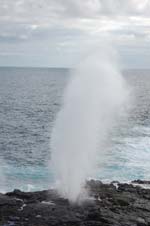Water 'Daze' Aplenty

Galapagos Island, Ecuador. Photo courtesy of Lieutenant Elizabeth Crapo, NOAA Corps.
Are you aware or involved in any of this month's environment campaigns or are they "just another day" to you?
This month's initiatives include:
National Ground Water Awareness Week, March 7-3
The National Ground Water Association (NGWA) says that about 12 million households nationwide rely on private wells for their water supply and many community water systems rely on groundwater in whole or part to meet water demands. This resource makes up about 95 percent of all available fresh water.
NGWA also says that everyone can become a good steward through the proper storage, use, and disposal of hazardous household substances, including gasoline and oil, paints and paint thinner, fertilizers, weed killers, pesticides, and cleaning products. Of course, proper water well construction, maintenance, and regular water testing and treatment are important, too.
World Water Day, March 22
Events all over the world are scheduled for the United Nations' initiative that got its start in 1992 in Rio de Janeiro.
According to the Web site maintained by the IRC International Water and Sanitation Centre in The Netherlands:
- 1,500 cubic kilometers of wastewater are produced globally each year, but much of it is not being reused;
- In developing countries 80 percent of all waste is being discharged untreated because of lack of regulations and resources; and
- Population and industrial growth add new sources of pollution and increased demand for clean water to the equation.
This year's theme is "Clean Water for a Healthy World," and the campaign seeks to raise the profile of water quality at the political level so that water quality considerations are made alongside those of water quantity.
Try not to confuse this international campaign with World Water Monitoring Day, which is officially Sept. 18 but actually encourages communities to monitor the condition of local rivers, streams, and other waterbodies March 22 to Dec. 31. It's a big project coordinated by the Water Environment Federation and the International Water Association.
Earth Hour, 8:30 p.m. local time, March 27
This young initiative, which began in 2007, involved WWF Australia as a demonstration against climate change. People simply turn off their lights for one hour. In two years, participation has grown from 2.2 million homes and businesses in Sydney to hundreds of millions of people in more than 4,000 cities in 88 countries, according to WWF.
Next month, we expand the one hour to about eight on Earth Day (April 22). Do you think that is sufficient? Do you think enough people are getting it and making changes?
Posted by L.K. Williams, EPonline on Mar 03, 2010